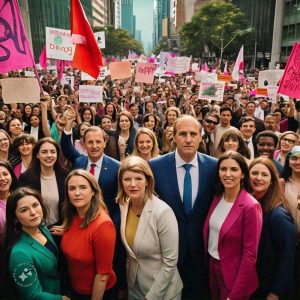Introduction
Women’s representation in Turkish politics has seen significant progress over the years. From early struggles for suffrage to the present day, Turkish women have continuously broken barriers and made strides in various political arenas. However, this journey has not been without its challenges, as cultural, social, and institutional barriers still affect the participation of women in Turkish politics. This article explores the historical evolution, key challenges, notable progress, and future outlook for women’s representation in Turkish politics.
Historical Overview of Women in Turkish Politics
Early Women’s Suffrage Movement
The fight for women’s political rights in Turkey began long before the establishment of the Turkish Republic in 1923. Women played a significant role in the country’s transition from the Ottoman Empire to a modern nation-state. Turkish women gained the right to vote in municipal elections in 1930, followed by the right to vote and stand in national elections in 1934. These rights positioned Turkey as one of the first countries in the world to grant women full political participation.
Major Milestones in Women’s Political Participation
Women’s political representation gained momentum after these early victories. In 1935, 18 women were elected to the Turkish parliament, marking a major milestone in the country’s history. Although this number remained small for decades, the foundations were laid for future female participation. In the 1990s, Tansu Çiller became Turkey’s first female Prime Minister, a pivotal moment that inspired many women to pursue political careers.
Challenges Women Face in Turkish Politics
Despite notable progress, women in Turkey still face numerous challenges in the political arena. These challenges range from cultural barriers to systemic issues that limit their participation.
Gender Stereotyping and Political Participation
One of the primary barriers women face in Turkish politics is gender stereotyping. Women are often seen as less competent or capable than men in leadership roles, which results in fewer women running for office or being promoted to higher political positions. Gender roles and cultural norms continue to impact how women are perceived and treated in politics.

Legal Barriers and Policy Gaps
In addition to cultural stereotypes, legal barriers and gaps in policy also hinder women’s participation in politics. Although Turkey has made strides in promoting gender equality, certain legal frameworks and policies still fail to fully support women’s political engagement. Issues such as limited maternity leave for female politicians and the absence of gender quotas in some political parties exacerbate these challenges.
Progress and Achievements in Recent Years
Increasing Female Representation in Parliament
In recent years, women’s representation in Turkish parliament has improved significantly. The percentage of women in parliament increased from just 4.6% in 1999 to over 17% in 2018. This rise is partly due to increased advocacy for gender quotas and the active participation of women in local and national elections. While this progress is commendable, Turkey still lags behind other countries in terms of female parliamentary representation.
Female Political Leaders and Role Models
Prominent female politicians, such as Meral Akşener and Gönül Saray Alphan, have become role models for aspiring women in politics. These leaders not only inspire younger generations but also push for legislative changes that prioritize women’s rights and equality. Their leadership has contributed to policy changes in areas such as education, health, and labor rights for women.

Impact of Women’s Representation on Policy
The presence of women in Turkish politics has had a tangible impact on policy, particularly in areas affecting women and families.
Women’s Rights and Family Law
One of the key areas where women have influenced policy is in family law. Female politicians have been instrumental in pushing for legal reforms that protect women from domestic violence and ensure equal rights in marriage and divorce. The passing of the Istanbul Convention on preventing violence against women was one such landmark victory, although Turkey’s later withdrawal from it in 2021 was a setback.
Economic and Social Policy Reforms
Women’s representation in Turkish politics has also driven economic and social policy reforms. Female politicians have advocated for labor rights, equal pay, and better working conditions for women. Their involvement has ensured that issues such as childcare and maternity leave are addressed in the legislative agenda.
The Role of Political Parties and Quotas
Political parties play a crucial role in either promoting or hindering women’s participation in politics. Gender quotas and party support are essential to increasing women’s representation.
Gender Quotas in Turkish Political Parties
Several Turkish political parties have adopted gender quotas to ensure a certain percentage of female candidates in elections. These quotas have been instrumental in increasing the number of women in politics. For example, the Peoples’ Democratic Party (HDP) mandates that 50% of its candidates be women, setting a strong example for other parties to follow.

Conclusion and Future Prospects
Looking ahead, women’s representation in Turkish politics is expected to grow as more efforts are made to break down barriers and promote gender equality. Continuing to challenge cultural stereotypes, enacting legal reforms, and increasing political party support for women are key to ensuring that women have an equal voice in shaping the future of Turkey.

